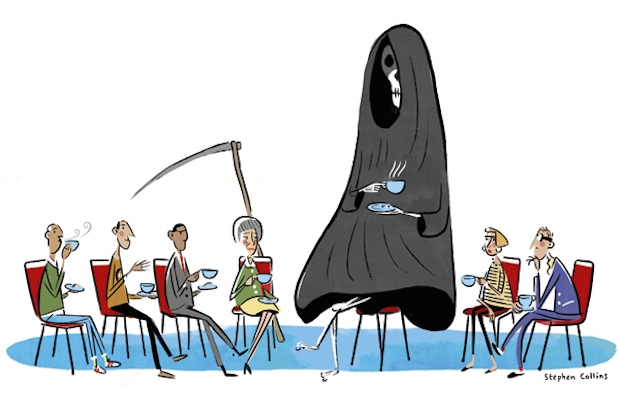Spectator readers who were listening to the Today programme this morning would have experienced the sense of déjà lu from a segment on ‘death cafés’. These events, where people talk about mortality over a macchiato and a Danish pastry, have interested Spectator writers for some time. Last July Mark Mason visited a ‘death café’ and remarked how refreshing it was to hear people use the ‘D-word’.
The cafes are for taboo-breaking rather than mourning. Mark found that people had been drawn to them because society is so reluctant to talk about death, which is strange when one considers that death is life’s only certainty.
Death cafés may help the fit and healthy consider their mortality in the abstract; but what do those who are dying making of them? Spectator readers will remember our brilliant colleague Clarissa Tan, who died earlier this year after a two year fight with cancer. Clarissa visited a death café – or more accurately a yurt – at the Good Funeral Awards last September and reported back for us. Here’s what she said:
‘I arrived expecting a weekend of black comedy. This is what I find, but there’s something else — a sincerity and straightforwardness that takes me by surprise. Many of the attendees are involved in the death business, as coffin makers and corpse tailors and funeral celebrants, because they feel our society does not pay enough attention to death. We avoid it, plaster over it, try to pretty it up and Botox it out of existence.’
Not everyone benefits from the experience, as Jo Beecham explained to us last month:
‘The woman sitting on my left is staring at me and making me nervous. She has been staring at me ever since I shared that I have a terminal illness and an illegal drug in the fridge. She needs to tell me that a hospice is a wonderful place and she has observed many wonderful peaceful deaths. She has to let me to know that it is a privilege to watch people die. I am beginning to feel really claustrophobic and worried that this woman wants to take me to a hospice and hold my hand while I die. I’ve got to get out. Luckily, the facilitator is bringing the session to a close and she tells everyone to come together and ask any questions they have in the big group. I have a question for the big group. How many people have come to the Death Cafe because like me, they have a terminal illness? No one raises his or her hand. I feel utterly crushed and utterly alone.’






Comments